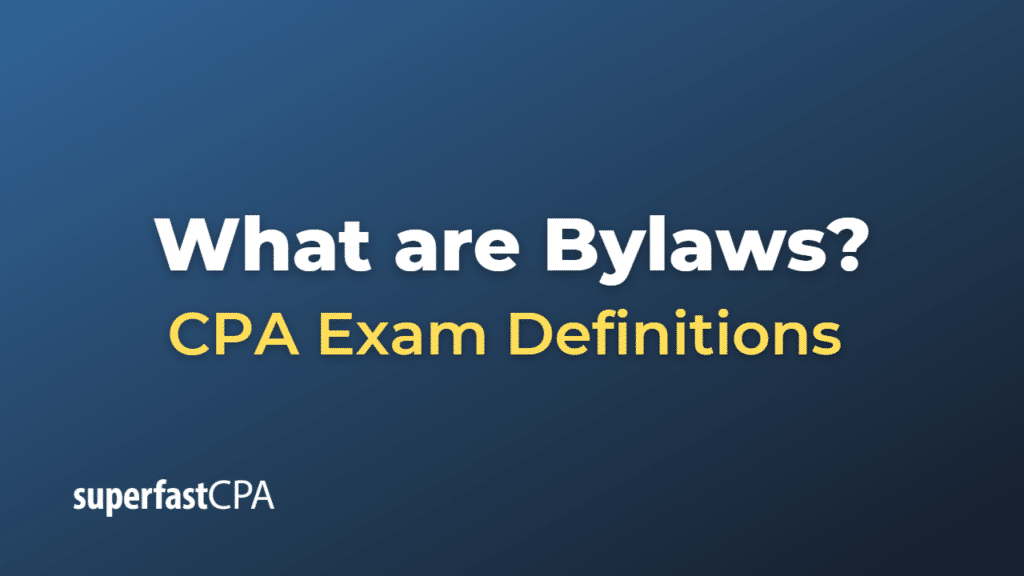Bylaws
Bylaws are a set of rules and regulations that govern the internal management and operations of an organization, such as a corporation, non-profit, or other types of entities. They outline the structure of the organization, define the roles and responsibilities of its board of directors, officers, and members, and provide guidance on various procedural matters, such as meetings, voting, and decision-making processes.
Bylaws are important because they establish a framework for how the organization will be managed and help ensure its smooth functioning. They can also help prevent and resolve disputes or conflicts that may arise within the organization.
Some common topics covered in bylaws include:
- Organizational structure: This includes the roles and responsibilities of the board of directors, officers, committees, and members.
- Board of directors: The size, composition, term limits, and election or appointment procedures for board members.
- Officers: The roles, duties, and appointment or election procedures for officers, such as the president, vice president, secretary, and treasurer.
- Meetings: Rules for scheduling, conducting, and recording minutes of meetings for the board, committees, and general membership.
- Voting: Procedures for voting on organizational decisions, including quorum requirements, proxy voting, and voting thresholds for different types of decisions.
- Financial matters: Procedures for managing the organization’s finances, including budgeting, financial reporting, and auditing.
- Amendments: The process for amending the bylaws, which typically requires a supermajority vote of the board or membership.
- Dissolution: Procedures for dissolving the organization and distributing its assets in case it ceases operations.
Please note that bylaws should be consistent with the organization’s articles of incorporation (or other formation documents) and applicable laws and regulations in its jurisdiction.
Example of Bylaws
Here’s an example of a simplified set of bylaws for a hypothetical non-profit organization called “Community Care”:
- Name
The name of the organization shall be Community Care. - Purpose
Community Care is a non-profit organization dedicated to supporting underprivileged families in the community by providing access to education, healthcare, and other essential services. - Membership
Membership is open to any individual or organization interested in supporting the mission and objectives of Community Care. Members shall have the right to attend and vote at general meetings. - Board of Directors
The Board of Directors shall consist of a minimum of five (5) and a maximum of nine (9) members, elected by the membership at the annual general meeting. Board members shall serve for a term of two (2) years and may be re-elected for a maximum of three (3) consecutive terms. - Officers
The officers of the organization shall be a President, Vice President, Secretary, and Treasurer, elected by the Board of Directors at the first board meeting following the annual general meeting. Officers shall serve for a term of one (1) year and may be re-elected. - Meetings
- The Board of Directors shall meet at least quarterly.
- The annual general meeting shall be held within three (3) months of the fiscal year-end, at which time the board members and officers shall be elected, and the annual financial report shall be presented.
- Special meetings may be called by the President or at the request of at least one-third (1/3) of the board members or membership.
- Notice of meetings shall be provided at least two (2) weeks in advance.
- Voting
- A quorum for board meetings shall be a majority of the board members.
- A quorum for the annual general meeting or special meetings shall be one-third (1/3) of the membership.
- Decisions shall be made by a simple majority vote of those present and voting, except for bylaw amendments, which shall require a two-thirds (2/3) majority vote.
- Finances
The organization shall maintain proper financial records, prepare an annual budget, and have its financial statements audited or reviewed by an independent accountant. - Amendments
These bylaws may be amended at the annual general meeting or a special meeting of the membership, provided that notice of the proposed amendment has been given at least two (2) weeks in advance. A two-thirds (2/3) majority vote of the members present and voting shall be required for adoption. - Dissolution
In the event of the dissolution of the organization, any remaining assets shall be distributed to one or more charitable organizations with similar objectives, as determined by the Board of Directors.
Please note that this is a simplified example and should not be used as-is for a real organization. Consult a legal professional to help draft bylaws that comply with the applicable laws and regulations in your jurisdiction.













